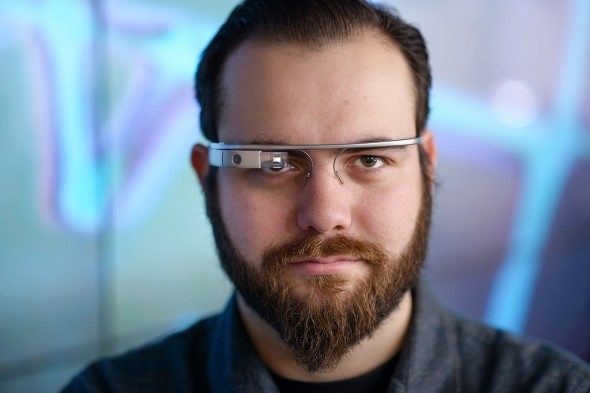Seeing future of technology in Google Glass
February 11th, 2014
Categories: Applications, Devices, Human Factors

About
In its February 11, 2014 issue, UIC NEWS features a story about UIC Electronic Visualization Laboratory (EVL) PhD student Victor Mateevitsi and the future of technology in such devices as Google Glass. Mateevitsi, though interested and talented in a number of computer science areas, has been focusing his research on the the field of “human augmentics,” an interdisciplinary field of study at UIC that is aimed at the research and development of technologies to expand the capabilities and characteristics of humans. Best known for his previous work on “SpiderSense,” Mateevitsi is now exploring possible uses (and detriments) to Google Glass.
The article “Seeing future of technology in Google Glass” by Matt O’Connor explores the potential for this technology. In the article, Mateevitsi explains: “People are still exploring what you can do with it. The processing power is not great, you need heavy video real-time image processing, like object recognition is really difficult, but you know it’s going to happen eventually.” The frameless, lightweight glasses have a number of useful features, including the ability to direct your eyes at a website, sign or other material with text and translate it into another language in seconds. A recent upgrade prompts a wink from your right eye to capture a picture. Simply say, “OK, Glass, share to Facebook,” and you’ve shared something in a matter of seconds. “It’s a different way of communicating with the data that is online and communicating with the world around you,” Mateevitsi said. He further goes on to say, “There is a lot of potential for augmented reality apps,” Mateevitsi said, “when the reality is augmented with information that is virtual and computed on the Glass.”
“These advancements are not without problems and critics. There definitely are privacy questions, which as a society we need to find answers to,” Mateevitsi said. “Because what happens if I’m wearing Google Glass and I’m recording you, but you don’t know about it?”… ”Think about in the future - the more we use the technology, the more we augment our world and the more we can make,” Mateevitsi said.
Read the entire UIC NEWS article.
Learn more about the UIC Human Augmentics class.